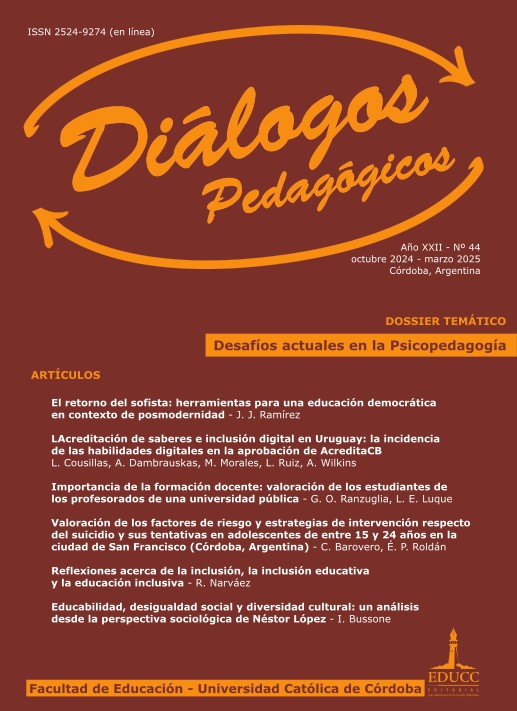The return of the sophist: tools for democratic education in Postmodernity context
DOI:
https://doi.org/10.22529/dp.2024.22(44)01Keywords:
politics, education, democracy, sophistryAbstract
Sophistry constitutes an intellectual movement, typical of the Greek democratic culture of the 5th century B.C. Among its most notable features, it is the vindication of the importance of education for public life. The text operates a counterpoint between the Platonic perspective and the sophist perspective of truth, politics, and education, and, at the same time, it postulates the possibility to rethink current education from a renewed perspective of the sophist movement.The expression "the return of the sophist" reflects the desired aspect in a Postmodern pedagogy with a democratic tone.Downloads
References
Bello, G. (1990). Richard Rorty en la encrucijada de la filosofía postanalítica: entre pragmatismo y hermenéutica. En R. Rorty, El giro Lingüístico. Dificultades meta filosóficas de la filosofía lingüística (pp. 9-44). Paidós.
Diógenes Laercio (2007). Vida de los filósofos ilustres. Alianza.
Duarte Lima, A. (2009). Richard Rorty, um sofista contemporáneo. Revista Redescrições, 1(3).
Enrici, A. (2000). La hermenéutica pragmática. Del espejo a la contingencia. La hermenéutica como desvío en Richard Rorty. UNPA.
Ferraris, M. (2002). Historia de la Hermenéutica. Siglo XXI.
Guthrie, W. K. C. (1994). Historia de la filosofía griega III. Gredos.
Larroyo, F. (1979). Historia general de la pedagogía. Porrúa.
Lyotard, J. (1993). La condición posmoderna. Informe sobre el saber. Planeta.
Mondolfo, R. (1983). El pensamiento antiguo. Historia de la filosofía greco-romana. Losada.
Nussbaum, M., Appiah, K. A., Barber, B., Bok, S., Butler, J., Falk, R., Glazer, N., Gutmann, A., Himmelfarb, G., McConnell, M. E., Pinsky, R., Purnam, H., Scarry, E., Sen, A., Taylor, C., Wallerstein, I. y Walter, M. (1999). Los límites del patriotismo. Identidad, pertenencia y ciudadanía mundial. Paidós.
Platón (1985). Protágoras. Diálogos I. Gredos.
Platón (1988). República. Diálogos IV. Gredos.
Ramírez, J. J. (2021). Richard Rorty, democracia contingencia y verdad. Herramientas pragmáticas para una filosofía política. Educc.
Rorty, R. (1990). El giro lingüístico. Dificultades meta filosóficas de la filosofía lingüística. Paidós.
Rorty, R. (1996). Objetividad, relativismo y verdad. Escritos filosóficos I. Paidós.
Rorty, R. (1998). Pragmatismo y política. Paidós.
Rorty, R. (2000). Verdad y progreso. Escritos filosóficos 3. Paidós.
Rorty, R. (2010). Filosofía como política cultural. Escritos filosóficos 4. Paidós.
Santos, B. (2016). La difícil democracia. Una mirada desde la periferia europea. Akal.
Varela, C. (2013). La institución como forma social creadora de subjetividad. Revista Anclajes, 75, 165-171.
Vattimo, G. (1996). Creer que se cree. Paidós.
Vattimo, G. (2010). Adiós a la verdad. Gedisa.
Wittgenstein, L. (2002). Investigaciones filosóficas. Crítica.
Downloads
Published
Issue
Section
License
Copyright (c) 2024 Juan José Ramírez

This work is licensed under a Creative Commons Attribution-NonCommercial-NoDerivatives 4.0 International License.








